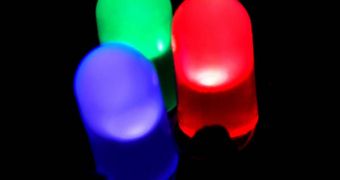Current lighting technologies, using incandescent light bulbs, are on the verge of getting replaced by compact-fluorescent bulbs (CFL), which are touted as being able to significantly reduce electrical consumption, whilst providing the same level of illumination. However, researchers at the Carnegie Melon University (CMU) have recently argued that the transition may be redundant, seeing how light-emitting diodes (LEDs) might make for a better alternative than either of the other two. They maintain that the technology is already developed enough to support wide-scale use.
“Lighting our houses, streets and commercial buildings constitutes more than 20 percent of total US electricity consumption. Light emitting diodes can reduce consumption and the emission of greenhouse gases because of their high-efficiency conversion of electricity to visible light,” CMU Department of Engineering and Public Policy (EPP) recent Ph.D. graduate Ines Lima Azevedo explains. She is also a researcher at the Climate Decision Making Center and the Electricity Industry Center, both at the Carnegie University.
Working together with other colleagues, the expert learned that existing LED technologies were already on the same pricing level, or even cheaper than existing lighting methods, including incandescent bulbs and CFLs. However, the diodes are a source of solid-state light, which may last for longer, have none of the poisonous gases that the others have, and also have a softer imprint on the environment.
“Technology and innovation in the area of lighting has quickly become a vital aspect of the broader movement toward increased energy efficiency and responsible use of global resources,” the Lord Chair Professor of Engineering and the Head of the EPP Department, M. Granger Morgan, shares. The expert is also a member of the Environmental Protection Agency's (EPA) Science Advisory Board and a member of the US National Academy of Science.
“In addition to providing an energy-efficient alternative, unlike the fluorescent tubes they replace, solid-state lighting is mercury free,” Morgan adds. “Even if the LED technology is cheaper on a lifecycle basis, consumers are likely to stick to what they know. We need the design of smart policies to make this transition,” Azevedo concludes.

 14 DAY TRIAL //
14 DAY TRIAL //